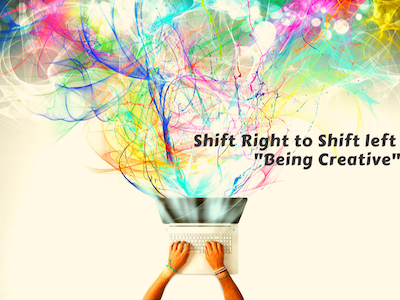T Ashok, @ash_thiru on Twitter
Summary
With machines become more intelligent enabled by AI, it is time we focus on creativity to think differently and exploit machines for its intelligence.
A focus in shifting to using right brain more will certainly help in the goal to “Shift Left” – that of prevention or doing less.
Good testing demands a great logical ability to dissect, decompose, analyse, synthesize, correlate, question, hypothesise, experiment, ascertain and make appropriate choices. It is surely a left brain activity. And tools take the outputs of these activities in becoming scripts to be used in an unattended mechanistic manner to reap significant benefits.
Having exploited the logical abilities and the technology to do well and faster, what next?
Testing is not just about finding issues, it would be valuable if this can help prevent issues or find it earlier before issues fan out. This is what we call as Shift Left, the ability to move left-ward in the software dev cycle to find earlier, ideally prevent. Today automation is seen as an enabler here too with the process, forcing one to think and come with scenarios/scripts before code commences or very immediately after code so that whatever is coded is validated. Given that tools are available in plenty, does not imply they have to be used every time, as it takes effort to script and maintain it.
Minimalism and simplicity are popular today, these can help in doing less by heightening sensitivity to aid in prevention and leveraging existing assets. Being creative enables sensitivity, the ability to not be pre-conditioned, to be random, to see beyond the visible and to come up with interesting possibilities. We know that covering everything from all angles seems impossible, certainly costly in terms of time, effort and money. Yes, we do resolve to use the logical ability to analyse risky areas and appropriately channel our energies.
The fertile right brain can cut through the chasm rapidly and enable significant benefits beyond the logical right brain. What does it take to cultivate a fertile right brain? What are the ingredients to fertility?
- Constraints – Setting up constraints enables creativity. When we are faced with pressure, we find means to do less, do quick and do well. It is like the survival instinct kicking in. Testing in short sessions helps in here.
- Write less – Writing long sentences as part of note-taking or worse still using software to document outcomes distracts you from exploiting the full power of creativity as we become logical in forming sentences and ensuring its correctness. Writing tersely in short phrases. Colours – Stimulate the visual senses too. Use colour sheets, pens, pencils, highlighters. Go beyond the black and white.
- Be non-linear – Sketch, mind-map, draw to express. Let not the act of writing be left-right & top-bottom deaden your senses. Sharpen creativity. After all minimalism is a constraint forcing us to go beyond to express sharp and crisp.
- Plan, yet stray – Before commencing a session, draw up a quick plan as to what you want to accomplish. As you go about the work, stray when you find something interesting, explore and improve understanding. Be sensitive to the clock though.
- Flow – Enjoying the work enables one to stay immersed in the work, and that is where time stops, a state of being in the ‘flow’. This is when the creative side is most fertile. Sharp and observant, super efficient, light and nimble a state when the work and the worker become one.
- Favour paper – During a session, to take notes, to jot down observations/questions, pen down to-do-actions, adopt a lightweight method. Using paper to do this is the easiest, also using Post-It notes, white board is super light, enabling one to stay immersed in the work and not be bothered about the act of writing/drawing. Using a heavy weight word-processor or a spreadsheet IMHO is a no-no, as it is seriously high friction. If you prefer software, use a light weight note taking software.
Testing is not a mundane job of evaluation bereft of fun. It is not a clinical act of evaluation that is done by machines. Our job is not just to write scripts and feed these machines.
It is true that in these times, the focus is on speed, on the act of evaluation. Yes, a machine executes tests really fast and is useful in continuous assessment. In a continuous development scenario, it gives us a sense of confidence that we are marching forward and nothing is broken. But remember that the ability to trust that it is not broken is a function of test scenarios/cases.This is normally the result of intelligent thinking.
With machines become more intelligent enabled by AI, it is time we focus on creativity to think differently and exploit machines for its intelligence.
A focus in shifting to using right brain more, will certainly help in the goal to “Shift Left” – that of prevention or doing less.
